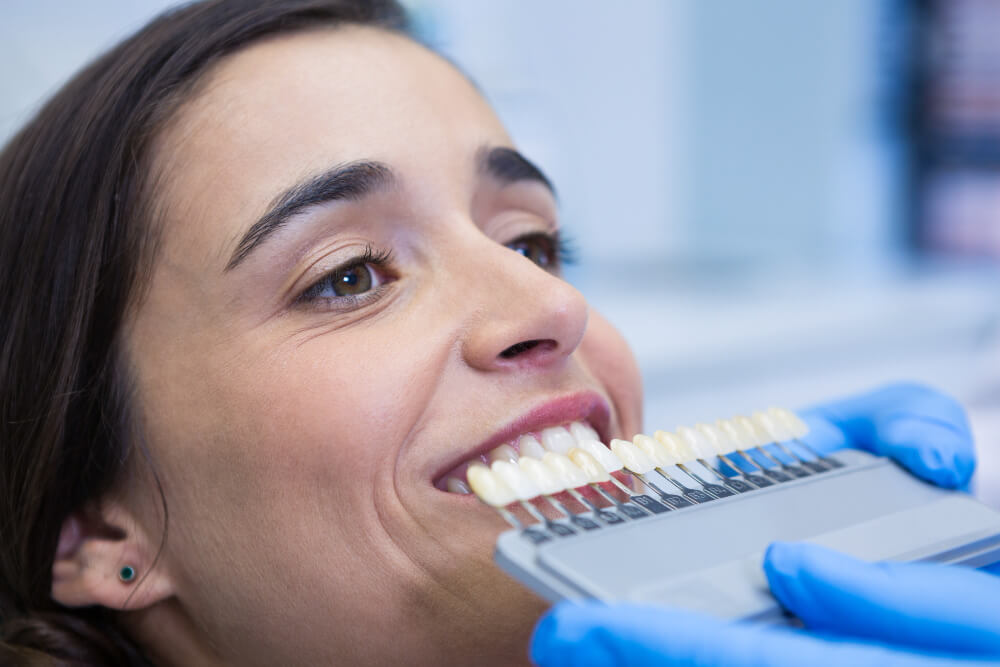Dental veneers are nowadays more than ever a top pick among cosmetic dentistry smile makeovers. Chipped, stained, or ever so slightly crooked teeth? Veneers provide a painless but highly effective means to get a white and symmetrical smile. Nevertheless, a question that is always on the mind of many people who are considering getting this done is: Are dental veneers painful?
The short answer is no, but there will be a time when there will be some pain in one form or another throughout the process. We will take you through everything that you will need to know before and after the process in order to make you more at ease obtaining veneers, including pain consideration, process, healing time, and immediate follow-up care.

What Are Dental Veneers?
Dental veneers are wafer-thin, usually porcelain or composite resin, shells fixed onto the surface of teeth to improve their appearance. They are custom-made just for you to fit the size, shape, and color of your own teeth, and you are left with a perfect smile.
Among the many veneer types, porcelain veneers are the most natural and long-lasting. If you are in New York and require this cosmetic treatment, you can consider porcelain veneer in Mt. Vernon, NY.
Learning About the Veneer Procedure
The veneer process is usually done in two to three dental visits, which involve consultation, tooth preparation, and veneer placement. Here is a step-by-step guide on what to expect:
1. Initial Consultation
You will have a consultation with a dentist before you can have the procedure. During this appointment, the dentist will:
- Examine your oral health
- Talk to you about your cosmetic objectives
- Take X-rays or impressions of your teeth
- Decide if veneers are right for you
If there are some underlying dental issues such as cavities or gum disease, you need to fix them prior to the veneer procedure.
2. Preparation of the Teeth
In preparation for the veneers, your dentist will remove a minimal layer of enamel (0.5-1 mm) from the front of your teeth. It is required to perform this process so that your veneers are well-fitted and look as natural as your own smile.
Does it hurt?
Most of the patients feel no pain or experience slight pain due to the removal of the enamel after local anesthesia has been used to numb the teeth. The sensitive teeth patients feel minimal pain.
3. Impressions
The impressions of your teeth are taken by the dentist after the preparation of teeth. They are sent to a dental laboratory where your personal veneers will be made. It takes 1-2 weeks for the fabrication of veneers.
In the meantime, temporary veneers may be placed to protect your teeth and maintain aesthetics. These temporary veneers are not as durable as permanent ones, so care must be taken when eating or brushing.
4. Veneer Placement
Once your custom veneers are ready, you’ll return for the final placement. The dentist will:
- Clean your teeth thoroughly
- Check the fit and color of the veneers
- Slightly etch the tooth surface for better adhesion
- Use dental cement to cement the veneers
- Harden the cement with a special light
Is this uncomfortable?
Most patients have little or no discomfort. You might feel some pressure during the bonding of the veneers, but this is temporary and not usually painful.
Do Dental Veneers Hurt? What to Expect During and After the Procedure
During the Procedure
- The fact that local anesthesia is administered means that there is little or no pain.
- You will experience a light pressure or sensations as enamel is being drilled off by the dentist.
- If you are extremely sensitive to dental work, your dentist will provide sedation options.
After the Procedure
- Light sensitivity or tenderness when eating hot and cold foods is expected but will clear within a few days.
- A few patients will experience gum soreness or light sensitivity around the worked area.
- Over-the-counter pain medication (such as ibuprofen) will relieve any discomfort following the procedure.
Recovery and Aftercare
Proper care is important to having an uneventful recovery and extending the life of your veneers. Following are important aftercare instructions:
1. Managing Sensitivity
Following veneer placement, you can be sensitive to teeth for a short time. This is because a thin layer of enamel has been removed. The sensitivity will pass in a few days or a week. Sensitive toothpaste can assist.
2. Oral Hygiene
Good oral hygiene is important to the long-term success of your veneers. Follow the following:
- Brush twice daily with a soft-bristled toothbrush.
- Use non-abrasive toothpaste to prevent scratching the veneer surface.
- Floss daily to prevent plaque accumulation.
- Go for regular cleanings and checkups at your dentist’s office.
3. Steer Clear of Hard and Sticky Foods
Porcelain veneers are durable but not indestructible. Avoid:
- Biting down on hard objects such as ice, hard candy, or raw carrots.
- Chewing pens, nails, or other objects that are not food.
- Sticky foods such as caramel that may pull on the veneers.
4. Protect Your Teeth from Damage
- If you clench your teeth while sleeping, consider wearing a nightguard.
- If you participate in contact sports, wear a mouthguard to prevent injury.
5. Limit Staining Substances
While porcelain veneers are stain-resistant, natural teeth are not. To maintain your smile’s evenness, reduce:
- Coffee
- Tea
- Red wine
- Tobacco products
Possible Risks and Complications
Although veneers are a safe and successful cosmetic dental treatment, there are certain potential risks:
1. Tooth Sensitivity
Some patients may experience longer-lasting sensitivity due to the removal of enamel. If the sensitivity persists more than a few weeks, see your dentist in Mt. Vernon, NY.
2. Gum Irritation
Gums will be sensitive or irritated right after treatment, but this will normally settle in a few days.
3. Veneer Damage
Even though veneers are strong, they can chip or crack if too much pressure is applied. Replacement or repair would be necessary if chipped or cracked.
4. Veneer Discoloration
Porcelain veneers are less susceptible to staining compared to natural teeth, but too much consumption of staining foods or poor oral care can lead to discoloration over time.
5. Uneven Bite
Rarely, veneers can change your bite slightly, which is uncomfortable. Your dentist can lightly trim the veneers if necessary.
How Long Do Veneers Last?
- Porcelain veneers remain 10-15 years or more with proper care.
- Composite veneers remain 5-7 years.
- Oral hygiene, diet, and visits to the dentist depend on the life of veneers.
Final Thoughts
So, are dental veneers painful? Not quite! While there could be some pain or sensitivity after and during the procedure, it is otherwise pretty tolerable. It is minimally invasive, and pain can easily be addressed through the application of anesthesia and follow-up.
For those interested in a porcelain veneer in Mt. Vernon, NY, finding an experienced cosmetic dentist is key to achieving natural and long-lasting results. Office like Aurora Smiles specialize in providing high-quality veneers tailored to each patient’s needs.
If you’re considering transforming your smile, schedule a consultation today and take the first step toward a more confident you!
